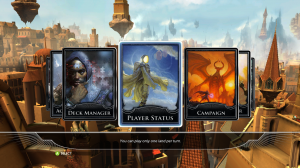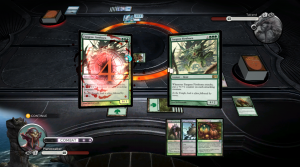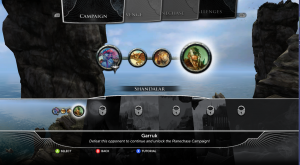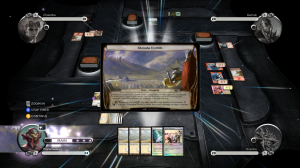Magic 2013 Review (XBLA)
- Updated: 13th Jul, 2012
What is it?
 The latest version of Magic: The Gathering but with tutorials and challenges. Perfect for people who enjoy complex rules and puzzles or used to play Magic.
The latest version of Magic: The Gathering but with tutorials and challenges. Perfect for people who enjoy complex rules and puzzles or used to play Magic.
Is it fun?
Absolutely. It’s a great introduction or refresher to the rules and the AI gives you plenty to think about.
Is it worth the money?
(800MSP or ~£6.99 on other platforms)
Yes. Despite the weirdly loud sound effects, there’s some great value here.
Why?
Magic 2013 brings you the challenges of Magic: The Gathering but without all that complicated business of having to actually build decks and meet with other people.
 For those who aren’t familiar – Magic: The Gathering is a collectible card game (CCG) that’s been around since 1993. You draw cards that can summon creatures, cause damage or boost yourself in some way. Each card has a spell cost, requiring you to draw mana from certain types of land. Throw in a turn-based system and you’ve pretty much got the idea.
For those who aren’t familiar – Magic: The Gathering is a collectible card game (CCG) that’s been around since 1993. You draw cards that can summon creatures, cause damage or boost yourself in some way. Each card has a spell cost, requiring you to draw mana from certain types of land. Throw in a turn-based system and you’ve pretty much got the idea.
Magic 2013 comes with 10 decks that you either unlock through the campaign mode or can buy for ~80p each. It’s perfect for lapsed Magic players like me who don’t want to be constantly spending money to keep up. Fellow TAG writer Pippa Hall had never played the card version of the game so I asked for her take as a newbie.
I’ve always shied away from trying the CCG Magic, in any of its iterations… just looking at the vast amount of physical cards you can purchase is enough to make me break out in a panicked sweat.
When Magic The Gathering: Duels of the Planeswalkers 2013 appeared on Steam it seemed a good opportunity to try and learn the game without being mocked by card wielding aficionados. Thankfully the game comes with enough of a tutorial and helpful hints to get you started, explaining aspects of the game you’d struggle to pick up as you played.
As for the rest, I often find a good thrashing at the hands of the AI serves as an ideal learning experience with encounters specifically designed for you to practice beating certain tactical plays. I’d still not be confident enough to play without the PC guiding & counting (no tournaments for me yet) but there’s enough hand holding here for even amateurs like me to become easily addicted to this franchise.
The game guides you through the phases of each turn and lets you zoom in on your own cards for detailed explanations of their effects, as well as any other cards in play. You can stop time at any point to examine your own hand and call up a more detailed explanation of your cards’ abilities whenever you need it.
When first unlocked, each deck contains the minimum 60 cards with 30 more unlockable throughout the game. There’s a deck manager that lets you add and remove cards and give you handy stats on things like deck speed, number of creatures and deck synergy. It all sounds a bit anoraky but comes in pretty handy when choosing your deck for the next match.
You’ll find four offline single-player modes:
- Throughout the campaign you’ll be pitted against a series of foes, each with a unique deck and playstyle. The “proper” foes – the ones indicated with a big circle in this screenshot of the campaign ladder – follow the same rules as you. They use shuffled decks and react to your choices.
 They also come with a brief description of their character, which you try to interpret into a playstyle when selecting your deck. The other way to learn their style is to just jump in and get destroyed because you’ve picked something completely inappropriate. This will probably happen a lot.
They also come with a brief description of their character, which you try to interpret into a playstyle when selecting your deck. The other way to learn their style is to just jump in and get destroyed because you’ve picked something completely inappropriate. This will probably happen a lot. - The smaller circles pictured are Encounters. These are opponents with a very restricted deck like lots of low-cost small creatures or loads of mana and a single enchantment that wins the game after a certain amount of mana is drawn. These encounters will play the same cards in the same order every time. You’ll find that they’re very good at revealing the strengths and weakness of your decks and can be useful at trying out new builds once you’ve unlocked a lot of cards.
- The Challenge mode provides short but thoughtful sessions. These are rather like chess challenges – you have a single turn to defend yourself and make a play to win the match. Of course, each hand is filled with cards that make all sorts of promises but only one tactic will win. It’s perfect for when you’re waiting for the kettle to boil or dinner to cook.
- There’s also the Planechase mode that puts you against 1 to 3 AI players and throws a plane card into the mix. Plane cards affects every player with modifiers like “All creatures are black”. In practice, this sort of modifier would effectively neutralise any spells targeting green creatures. Depending on a dice roll, a new plane is drawn (hence “planeswalker”) or an additional effect can come into play. Keeping track of all the planes and cards and 3 different opponents can quickly become overwhelming for a new player. It’s lots of fun but save it for when you’re comfortable with your decks.
Multiplayer comes in three flavours. Free-for-all is standard Magic but launches as soon as you have two or more people in the lobby marked as “Ready”. Planechase is the same as the single-player mode only with real people. And then there’s Two Headed Giant
 Two Headed Giant pairs you with another player against another pair. You share the equivalent of 30 hit points and each pair takes their turn simultaneously. I imagine it’s great when paired with a friend but lack of communication options makes it very frustrating when you get this mode in Quick Match. Without voice chat there’s no way to coordinate your moves. Add to that an unfamiliarity with every card in every deck and it’s easy to feel like you’re ruining everyone’s experience by stopping to look at the cards being played. Don’t play this unless you really know what you’re doing.
Two Headed Giant pairs you with another player against another pair. You share the equivalent of 30 hit points and each pair takes their turn simultaneously. I imagine it’s great when paired with a friend but lack of communication options makes it very frustrating when you get this mode in Quick Match. Without voice chat there’s no way to coordinate your moves. Add to that an unfamiliarity with every card in every deck and it’s easy to feel like you’re ruining everyone’s experience by stopping to look at the cards being played. Don’t play this unless you really know what you’re doing.
Magic 2013 provides the perfect introduction for new players and enough depth to keep experienced players entertained. There’s a free demo available online.
Magic 2013 is out now on XBLA, PSN, PC and iOS. The iOS free version comes with limited decks and can be upgraded for the full experience.


Follow Us!